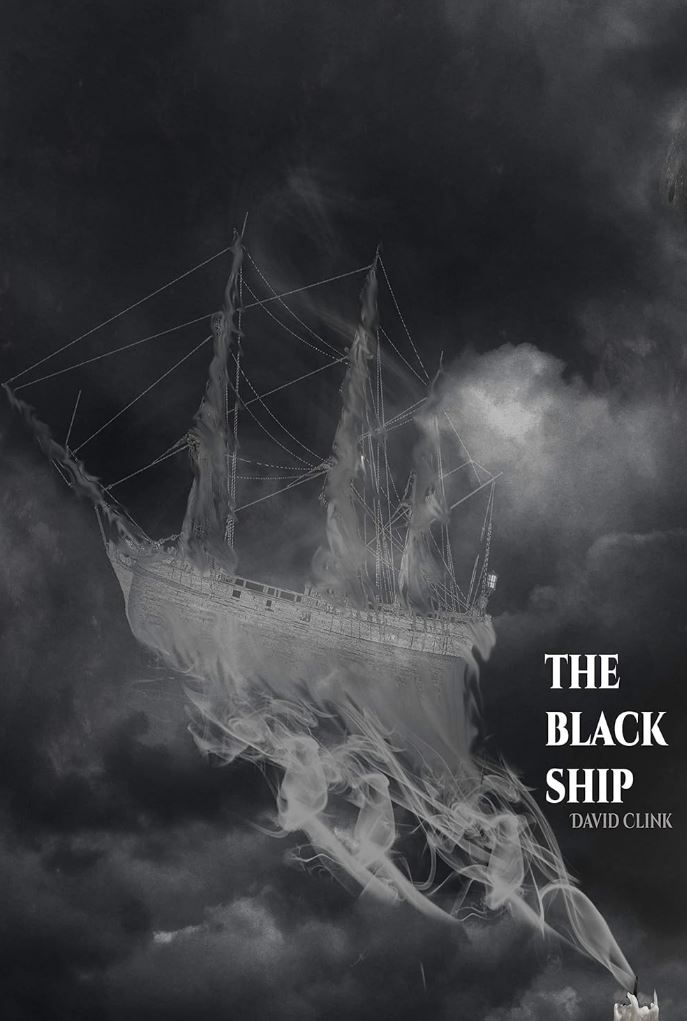The Black Ship by David Clink. Aeolus House 95 pages, octavo, square bound. $20.00 CAN. ISBN: 978-1-987872-58-0 https://www.amazon.ca/Black-Ship-David-Clink/dp/1771485760/ref=sr_1_9?dchild=1&keywords=the+black+ship+david+clink&qid=1607449534&sr=8-9
A Review by Herb Kauderer

The Black Ship is David Clink’s fifth full-length poetry collection. It is divided into six fairly balanced sections each titled. While many of the poems are somehow related to the sea and sailing, many more are not. Those familiar with Clink know that he excels at the non-sequitur, the dislocating change of voice and pace. Some poems such as the opening “The Light House”are fairly straightforward. Others, such as “This Is The Babylon They Say” are very non-linear. While there is whimsy at times, there is also darkness and the macabre.
To love a ghost,
keep the windows and doors open.
-16 “Mirror Life”
The above quote may straddle darkness and macabre. The next selection lands firmly in macabre.
A sign on the fence said: “Danger, due to ___”
and someone had handwritten in: “Happiness.”
The populace ripped the fence down, tore into each other,
blood mingling with the spring’s waters. And yet,
people still put their mouths around the gushing hole,
a blood-water mix finding its way down their throats.
-17 “The Spring of Joy”
Clink is particularly adept at wild humor, nicely represented here with the prose poem “Back Story”. In this meta poem a reader compliments an author about the intentionality of his poetry but asks about the backstory of a specific plant mentioned in a poem. He “need[s] to know more about it, its background, where it came from” (47). To answer the question fully, the author creates ... , the poem creates an entire universe including the mysterious “cruel botanists (who happen to be shape-shifting identical twins)” who run the garden centre (47).
Clink also tends to tell of everyday things in a mythic voice, and fantastical things in an everyday detailed voice. These clashes of language and image can be funny or dark. The commonplace rhythms pull the reader along so that when the non-sequitur happens there is the sensation of missing a small stair. Here is an example from another prose poem, “The Dead Languages of the Wind”:
those people gone forever except for what they left behind: the ruins stretched out beyond our reckoning, graves scattered on hillsides, graffiti, dental work, knee and hip replacements, the scrapbooks and cancer wigs.
-19
This is not to suggest that all the poetry is jarring. Some is quite smooth such as this from “The Sunset Girl”:
The sunset girl’s dappled hair of leaves
falls gently on bark shoulders as she walks
the shadowed forest floor beside the coyote,
both with shapeshifting eyes.
-85
Another way that the poet mines the everyday, is by periodically reminding readers that he is in Canada. Poems doing this include “Disturbing Raw Milk in Ontario”, “Murder Is a Liquid, and the City Is Killing Us”, and “Two Things”.
The titles of the book and its sections are minimalist. The sections are: Waters, Bloom, Babylon, Unravelling, Blue, and Manifestation. One word each. Not so the titles of the poems themselves. Much of the sense of the book can be gleaned from their titles: “Do Not Engage the Sky. Just Observe and Report.”, “My Mother’s Bones Glow So Beautifully”, “Planktivorous Fish and the Structure of Pelagic Plankton”, “Two Things” “The Valet of the Shadow of Death”, “Why Dolphins Are Eating Ambassadors from Other Planets”, “A Premonition of Rain”, “Icarus Rising”, and “I Was on My Way To Tell You There Is a Vast Machine Intelligence Plotting Our Downfall, Or, the Time Machine” which was nominated for the Rhysling Award in the long category this year. Four other poems are previous Rhysling nominees. The book itself is an Elgin nominee.
In a book this rich and diverse it is easy to find something to like, though Clink’s humor and disruption of rhythms is not for everyone. Twenty-nine of the forty-four poems are new. Overall, if you’ve liked Clink’s previous work, you’re likely to enjoy this. If you haven’t encountered his work, this is a fine example.

Herb Kauderer is an English professor at Hilbert College near Buffalo, NY. His poetry has appeared in hundreds of markets including the Dwarf Stars and Rhysling Anthologies. His most recent collection is The Book of Sleep, currently an Elgin nominee.
Poet? Publisher? Reviewer? We review speculative poetry! Send a query to SpecPoReviews@gmail.com and we'll take it from there.

New to THE SPECk? Want more? Go to this happy place and subscribe to THE SPECk; the SFPA Insider Newsletter. It’s free. https://mailchi.mp/d1224ca996e9/thespeck

The SFPA is a global poetry organization supported and sustained by its members. It is celebrating its 45th anniversary. Becoming a member of the SFPA not only helps us continue to connect speculative poetry to the world, but is also comes with some pretty cool benefits.
Joining is easy! Visit: http://sfpoetry.com/join.html
